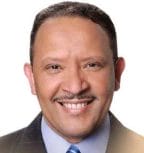
“In my Inaugural I laid down the simple proposition that nobody is going to starve in this country. It seems to me to be equally plain that no business which depends for existence on paying less than living wages to its workers has any right to continue in this country. By “business” I mean the whole of commerce as well as the whole of industry; by workers I mean all workers, the white collar class as well as the men in overalls; and by living wages I mean more than a bare subsistence level – I mean the wages of decent living.” – President Franklin Delano Roosevelt, upon signing the National Industrial Recovery Act in 1933
Nowhere in the entire country can a full-time worker earning the federal or state minimum wage afford a two-bedroom apartment a fair market rent.
One in nine U.S. workers are paid wages that can leave them in poverty, even when working full time.
Over the last 40 years, wages for the lowest-paid workers have barely budged, while wages for the wealthiest have more than tripled.
In a nation that calls itself the land of opportunity, where we claim as a value an honest day’s pay for an honest day’s work, our dismally insufficient federal minimum wage is practically a crime. That’s why the National Urban League has thrown its support behind legislation recently introduced by Rep. Bobby Scott, the Raise the Wage Act of 2019.
The bill would gradually raise the minimum wage to $15 by 2024, index future minimum wage increases to median wage growth and guarantee that all workers are paid at least the full federal minimum wage by phasing out the subminimum wages for tipped workers, youth workers and workers with disabilities.
Had the minimum wage kept pace with worker productivity since the 1940s, it would be just under $22 per hour – more than triple what it is now. Instead, the vast majority of the gains from that increased productivity have gone to the wealthiest. The average CEO pay is 271 times the average pay of the typical American worker. In 1978, CEO earnings were about 30 times the typical worker’s salary.
The Urban League Movement has long advocated for a federally-mandated living wage tied to the rate of inflation, and it is a central element of our comprehensive blueprint for eliminating economic disparity, The Main Street Marshall Plan.
A fair living wage not only raises the living standards of workers, but also stimulates the economy to benefit the nation as a whole. When he signed the National Industrial Recovery Act in 1933, in the throes of the Great Depression, President Franklin Delano Roosevelt asked skeptics to consider “the improvement of operating figures by greatly increased sales to be expected from the rising purchasing power of the public.”
In fact, researchers estimate that a 10 percent increase in the minimum wage would increase sales by around $2 billion each year.
Raising the minimum wage to $15 by 2024 would lift wages for 41 million American workers, including 40 percent of all African-American workers. The average age of workers who will benefit from the bill is 36.
Contrary to claims by opponents of a fair federal living wage, moderate increases in the minimum wage have little to no impact on employment. A University of California at Berkeley study last year examined the effect of minimum wage increases in six cities and found pay increases for workers and no significant employment reductions. A more extensive study by the London School of Economics examined the impact of 138 separate minimum wage increases implemented between 1979 and 2016, and found no overall reduction in low-wage jobs.
Income inequality in the United States is out of control and threatens not just economic stability of our nation, but our democracy itself. Full-time workers shouldn’t live in poverty anywhere, but especially not in the wealthiest nation on earth. The Raise the Wage Act would bring the federal minimum wage in line with economic reality and bring us closer to the promise of the American Dream.
Marc H. Morial is President and CEO of the National Urban League. He was a Louisiana State Senator from 1992-1994, and served as mayor of New Orleans from 1994 to 2002. Morial is an Executive Committee member of the Leadership Conference on Civil Rights, the Black Leadership Forum and Leadership, and is a Board Member of both the Muhammad Ali Center and the New Jersey Performing Arts Center.

